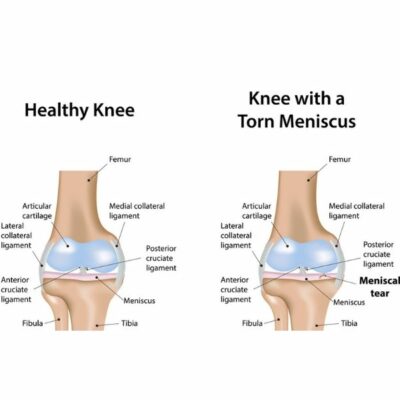Meniscus Tear Specialist

Are you experiencing pain and stiffness in your knee? If so, you may have torn your meniscus. A meniscus tear is among the most common knee injuries. A torn meniscus can occur in several different ways. Meniscus tear specialist, Dr. James Mazzara provides diagnosis and both surgical and nonsurgical treatment options for patients in Manchester, South Windsor, Enfield, Glastonbury and surrounding Hartford communities who have torn their meniscus. Contact Dr. Mazzara’s team today!
Meniscus Tear and Meniscal Deficiency of the Knee
What is a Meniscus Tear?
A meniscus tear is among the most common knee injuries seen in sports. A meniscus tear can also occur outside the sports world to individuals during activities of daily living, when there is a strong twisting event that occurs in the knee. If an individual is speaking about tearing one’s cartilage, they usually mean they have torn their meniscus. Dr. James Mazzara, orthopedic knee specialist in Manchester, South Windsor, Enfield, Glastonbury and surrounding Hartford communities, specializes in treating patients with a meniscus tear.
What is the Meniscus?
The meniscus is a C-shaped piece of cartilage between the femur (thigh bone) and the tibia (shin bone.) Its job is to stabilize the knee while acting as a shock absorber between the bones. There are two menisci found in the knee, one is called the lateral meniscus and is found on the outside area of the knee joint; while the other one is called the medial meniscus, which is found on the inside area of the knee joint. The lateral meniscus bears up to 80% of the load applied to the outside compartment of the knee and the medial meniscus bears up to 50% of the load applied to the inside compartment of the knee. The meniscus plays an important role in keeping the knee stable while protecting the ligaments against force. It also provides lubrication for the knee joint, so it moves easily.
What is a Meniscal Deficiency?
Without the fibrocartilage ring of the meniscus, the bones and cartilage of the knee are subject to added stress and degeneration over time. When the knee joint breaks down due to the absence of the meniscus, it is referred to as a meniscal deficiency. This condition can cause the misalignment of the bones in the knee joint and can contribute to the onset of arthritis. Years ago, before the use of modern knee arthroscopy techniques, it was a common practice to remove the entire torn meniscus following a knee injury. This was performed as an open surgery with a large incision and created a complete loss of meniscus function leading to the development of osteoarthritis. Removal of the medial meniscus caused and bow-legged deformity and removing the lateral meniscus caused a knock-knee deformity. Today, the meniscus is usually repaired if injured because orthopedic physicians agree that it plays a significant role in the overall health of the knee.
What are the Symptoms of a Meniscus Tear?
Meniscus tears can vary in size, location and severity. Pain can also vary from mild to severe and it’s not unusual for patients to still be able to walk with a meniscus tear. Several symptoms to watch for with a meniscus tear:
- Pain
- Stiffness
- Swelling
- Catching or locking of the knee
- The knee “giving way” or instability
- Patients sometimes hear a “pop” at the time of injury
- Inability to move the knee through its full range of motion
How are Meniscus Tears Diagnosed?
Dr. Mazzara will discuss with the patient their medical background, history and how the injury occurred. He will perform a physical examination of the knee, including what is called the McMurray test – where he will bend the knee, then straighten and rotate it while checking for pain or clicking. Dr. Mazzara will also check for tenderness along the joint where the meniscus sits, which is often a sign of a tear. Radiological tests may be requested to tell the extent of injury, including x-ray and MRI.
How is a Meniscus Tear Treated?
The type of tear, size and location are all contributing factors of how Dr. Mazzara will treat a meniscus tear. Some meniscus tears may be degenerative which means they resulted from routine activity with no significant trauma. These are often treated without surgery and may also be associated with osteoarthritis in the same knee. Other tears may be the result of a specific event or injury. It’s usually sudden onset is associated with a specific event or unusual knee position or injury that patients will recall as the onset of their pain.
Does a Meniscus Tear Require Surgery?
Degenerative tears or those associated with some osteoarthritis may not require surgery and are often treated with anti-inflammatory medications, a steroid injection and physical therapy.
How is a Meniscus Tear Treated with Surgery?
In knees without arthritis with a painful and symptomatic meniscus tear or for patients who fail to improve with non-operative treatment who have minimal arthritis, Dr. Mazzara may recommend a minimally invasive surgery called arthroscopic repair. This procedure involves a miniature camera and small surgical instruments, inserted into the knee to resect or repair the tear.
Dr. Mazzara will assess the damage of the meniscus and based on the patient’s age, size of the tear, location and other injuries, will decide to repair or resect the torn meniscus. For a meniscus to be repairable, the tear must be in the section of the meniscus where there is a healthy blood supply (the outer one third of the meniscus) and it must be of a certain size and pattern. Tears that extend into the inner two thirds of the meniscus will not heal if repaired and are trimmed back to healthy stable meniscus tissue. This is called a meniscectomy.
Rehabilitation for a meniscus repair is about 3 months, with considerably less time for a debridement – approximately 3 to 4 weeks. Physical therapy may be prescribed once the initial healing is complete. Regular exercise to restore the knee’s mobility and to strengthen the joint is necessary. Range of motion, followed by strengthening exercises will gradually be added to a patient’s rehabilitation plan.
To learn more about a meniscus tear and meniscal deficiency, or to inquire about knee pain and other related symptoms, please contact the orthopedic offices of Dr. James Mazzara, orthopedic knee specialist in Manchester, South Windsor, Enfield, Glastonbury and surrounding Hartford communities.
